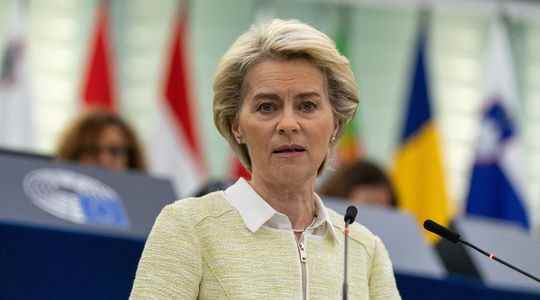While the finance ministers of the G20 countries, meeting in Indonesia, did not agree on the adoption of a common text because of differences over the war in Ukraine, the foreign ministers of the European Union well, Monday, July 18, put in place new sanctions against Moscow. While progressing in the Donbass, Russia is seeking to regenerate its military equipment. To this end, Russian officials have visited Iran twice in the past two months.
- The European Union wants to toughen its sanctions against Russia
European Union foreign ministers will discuss tougher sanctions against Russia on Monday, as Moscow is accused of deploying launchers to fire missiles from the Zaporizhia nuclear power plant in the southern Ukraine. In particular, they will examine the European Commission’s proposal to ban gold purchases from Russia in order to align the European Union’s position with that of the G7 countries. New Russian personalities should also find themselves on a blacklist and be the target of sanctions. “Moscow must continue to pay a high price for its aggression,” said the President of the European Commission, Ursula von der Leyen, after transmitting the new measures to the Twenty-Seven.
- Russian delegation visited Iran twice over drones
According to the White House, the Iranian army presented its drones to a Russian delegation during two meetings in Iran, on June 8 and July 5. The meetings were held at Kachan Air Base, 200 kilometers from the capital, Tehran. “We are releasing these images taken in June showing the Iranian drones that the Russian delegation reviewed that day. This suggests continued Russian interest in acquiring Iranian combat drones,” the national security adviser said. Jack Sullivan. “As far as we know, this is the first time that a Russian delegation has visited this air base for such a presentation,” he added. To deal with Ukrainian resistance, Russia has been trying for several weeks to beef up its military arsenal.
- No joint statement after the G20 meeting in Indonesia
A meeting of G20 finance ministers and central bank governors in Indonesia ended on Saturday without a joint statement, due to lack of consensus among member countries due to disagreements over the Russian offensive in Ukraine. During the two-day meeting, on the island of Bali, the big moneymakers sought answers to the global food and energy crises. But a new confrontation between Westerners, who denounce the impact of the war in Ukraine on the economy, and Russia, which accuses western sanctions to be at the origin of the deterioration of the economic situation, made any agreement impossible.
US Treasury Secretary Janet Yellen on Friday accused Russia of having “sent a shock wave affecting the global economy”, and several Western ministers denounced the complicity of Russian economic leaders in the atrocities committed in Ukraine . Instead of a joint communiqué, Indonesia, which is hosting the G20 this year, has proposed a statement on behalf of the presidency. “We are going to publish a summary of the presidency which will describe what we have been able to obtain from this G20”, explained the Indonesian Minister of Finance during a closing press conference.
Indonesia, which pursues a non-aligned foreign policy, had not yielded to Western pressure to exclude Russia from G20 meetings. Russian Finance Minister Anton Siluanov participated virtually while two Russian officials were on hand. His Ukrainian counterpart, Sergii Marchenko, also spoke by videoconference.
- Russia claims progress in Donbass
Ukraine and its Western allies also remain reeling from the cruise missile strikes that devastated the center of Vinnytsia on Thursday, hundreds of kilometers west of the front. The toll of this attack was raised on Saturday to 24 dead. “Unfortunately, a woman died in hospital today, she was 85% burned,” announced the governor of the Vinnytsia region, adding that 68 people continued to receive treatment, including four children.
In the Donbass, the separatist forces and the Russian army have claimed to continue to progress and to be in the process of taking complete control of the city of Siversk, attacked after the capture of Lysytchansk, which opens the way to Kramatorsk. The Russian Ministry of Defense indicated that Sergei Shoigu, the minister, had visited the soldiers involved in the offensive in Ukraine, without specifying the date of this visit. This is the second recorded, after that of June.
